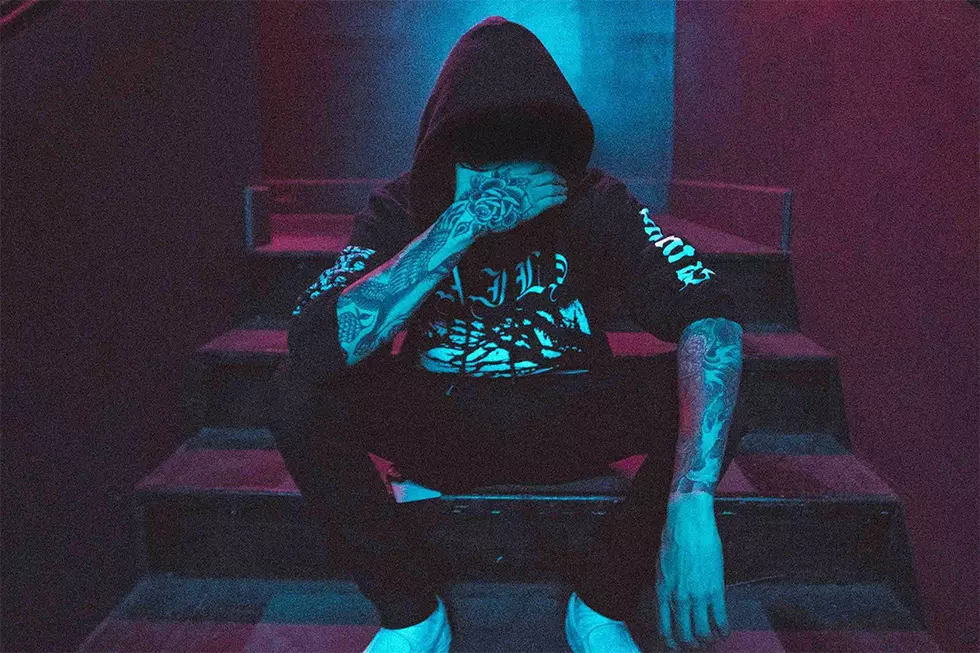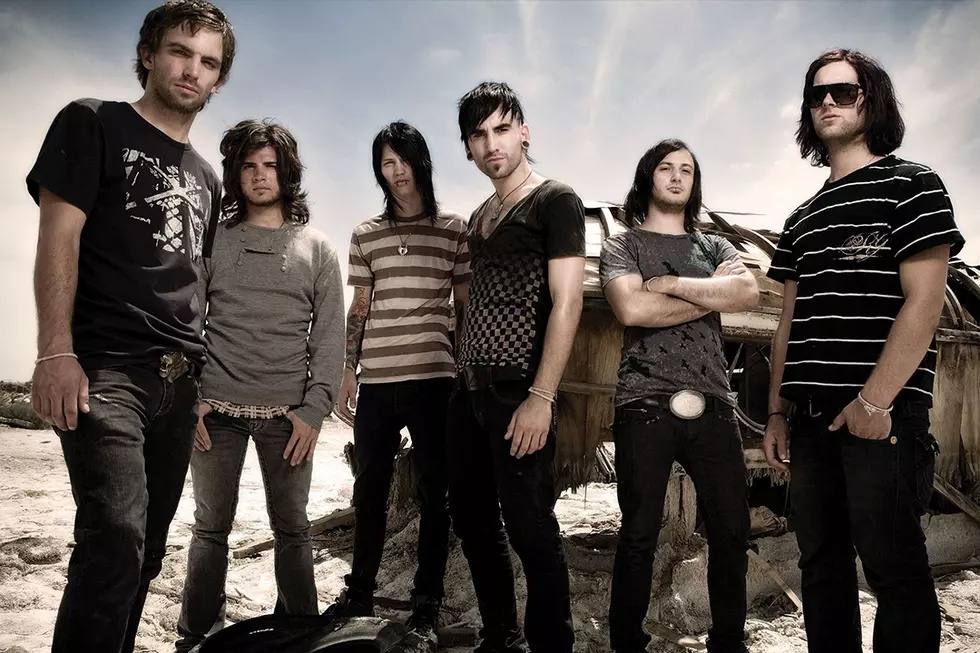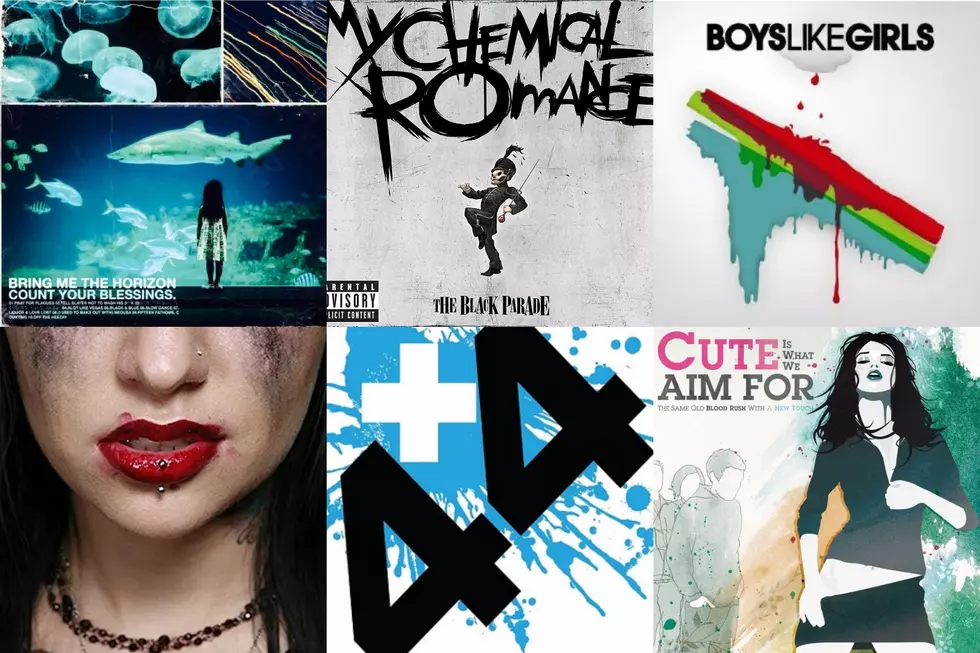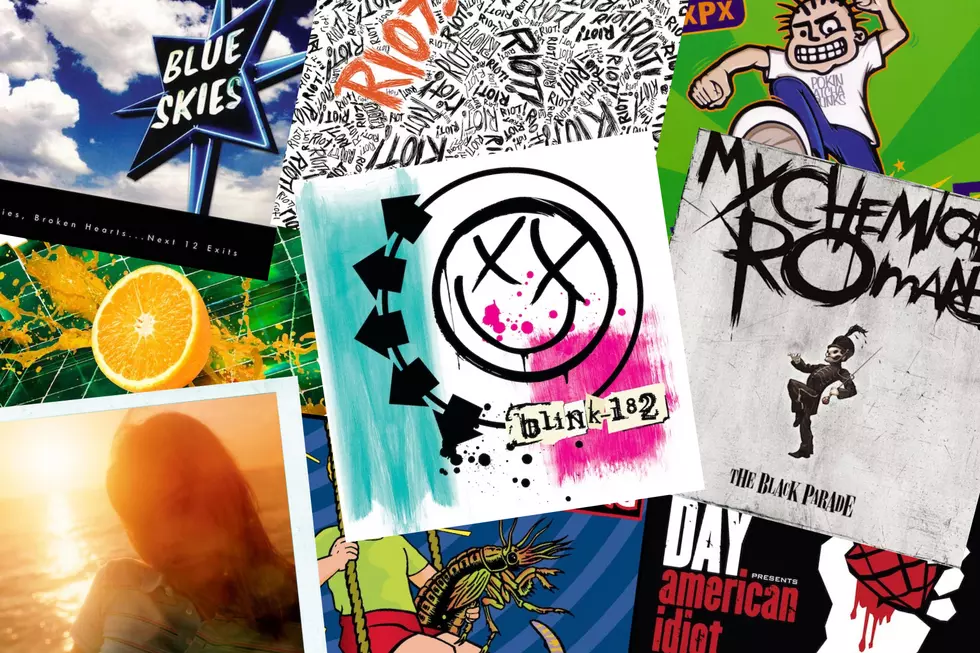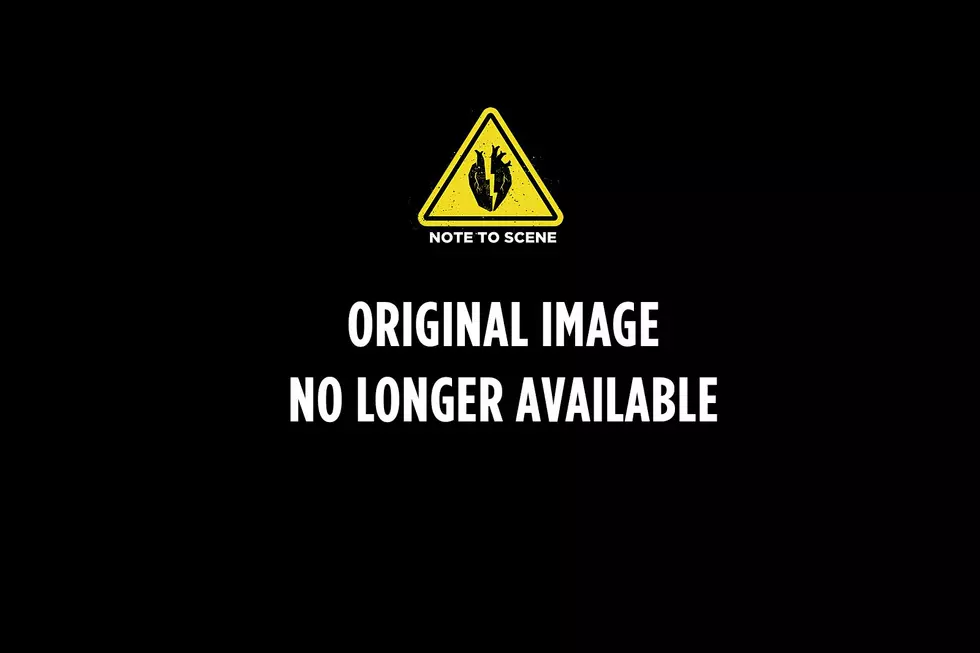
Sky Eats Airplane Has a “Damn Good Chance” of Releasing New Music
Sky Eats Airplane were years ahead of their time.
The band formed in the mid-2000s and released their scene classic, Everything Perfect on the Wrong Day, in 2006. They offered a sound that, at the time, nobody else was executing. And now, 14 years later, artists are still taking things from it.
In August, Tragic Hero Records released the album on vinyl for the first time. This sent fans into a frenzy, with multiple packages selling out and comment sections getting flooded with reunion questions.
We interviewed the group's two original members, Lee Duck and Brack Cantrell, on their history, sound evolution, label drama and the "damn good chance" that Sky Eats Airplane will release new music. Lee and Brack were the sole members that put together Everything Perfect and they offered a candid insight to not only the Sky's past, but how they created such a unique sound in a world that was notorious for carbon copies.
Along with a new Sky Eats Airplane merch items that are still available in the Tragic Hero Records store, get ready for another vinyl variant of Everything Perfect to go live soon. Go pick something up and relive the glory days.
First off, thank you guys so much for taking the time out. I know, everyone is super busy. We literally do this website and podcast on the side too at this point. When was the last time you guys did an interview for Sky Eats Airplane?
Brack Cantrell: I don't think we ever did an interview. If we did one it was undoubtedly back in like what, it had to be 2007?
Lee Duck: 2005 or six?
BC: Somewhere around there if we did one.
So take me back to 2006. Everything Perfect on the Wrong Day was just you two. I listen to that album now and it seriously blows my mind that something sounded like that in 2006, considering so many bands ripped that sound like two and three years later. And now again, 14 years later. “She Is Just a Glitch” sounds like every emo bro with a Soundcloud account in 2020. What do you guys remember about creating that record?
LD: There's a lot of magic that happened there that was just kind of unpredicted. Things that really worked out well. I think at the end of the day, a lot of that record just came from Brack and I just [being] excited about the idea of a certain sound and that sort of soundscape, without any sort of preconceived notions of what that might need to be, no sort of labels swaying us in any sort of direction or anything like that. It was just from the heart with like what we were interested in at the time. And through ignorance and naïveté we put some interesting things together. Now, I do have to say that Brack brought the most structure to this when it comes to songwriting and music production. That was a really eye opening experience for me to go through. Because Brack, I'm sure you worked tirelessly on learning how to use your cracked copy of Adobe Audition...
LD: Yeah. Actually, I don't know, you might have paid for it.
BC: I do remember getting Fruity Loops on a disk for sure
LD: Different day in age today. Anyone could just jump on to the internet right now and you can literally just play monkey-see-monkey-do and try to figure something out. But it's kind of like this lack of just exploring for the sake of exploration. That's kind of the definition of this record for me was that it was just this purity of exploring the mystery and being comfortable with that. Not really knowing what the result is. We didn’t even think we were going to do anything... we just put that stuff up on MySpace. I think Brack that was your idea? We were essentially just trying to be a part of our local music scene and we were interested in playing with interesting soundscapes and, you know playing shows.
BC: I think that pretty much covered it. At the time we were listening to a lot of music, we had a lot of influences. We were just having a good time just trying to get some sounds down, get some ideas, playing with how it sounds. We didn't have a lot of concerns as far as where we'd go or anything like that. We didn't feel any pressure or tugging from any direction.
LD: A lot of that came too, like Brack and I previous from that project, we were with a gentleman by the name of Daniel Hunter, who ended up actually also starting a pretty notable band at the time called Play Radio Play. Daniel, me and Brack were really close with each other. We were in several projects before that, and we started a project ourselves. I think through that we created sort of like a kinship and essentially learned about the recording process and going through that together, and learning about how each other worked. We first started working on some interesting random tracks. We were part of the local music scene and we would ask to play the small room and we would just show up with like a PC laptop running some interesting early DAW software and putting MP3’s in there and trying to figure it out while we're on stage. So [we] had a really natural iteration with it. We were just playing tracks and just seeing how it went with the kids. And I mean we were kids ourselves. Brack do you have any memories of the online traction that we had?
BC: Not really. I mean, it was all pretty much based around MySpace. That's what I remember. As far as when it started to catch on... I don't know what caused that. I really don't know... like organic, word of mouth I guess?
LD: We were starting on recordings, I think in 2004, because I graduated high school in 2005. I know you were eighth grade when we were just like starting to work on [things].
What were you guys even listening to back then? What were some bands that inspired you to even sound like this?
BC: As far as the things that were somewhat close to what we were doing, that Genghis Tron band inspired me a lot. I heard that I was like, "Whoa, that's the first time I've heard this music played in this context." That was a band that grabbed my attention for sure. But we were listening to a lot of the same scene-metal-type stuff as everyone else was, like Senses Fail, Circa Survive, that kind of stuff.
LD: You really had a lot more pop sensibilities than I did. You brought catchiness to that whole project, and I definitely brought more of like, sporadic intensity, but you were still better at guitar than me.
BC: We were playing that good-cop-bad-cop role.
LD: [Growing up] I wasn't really exposed to a lot of like, current music at the time. My mother was pretty restrictive with what I was able to listen to, so I had to sneak in Korn CDs. But I remember once we were able to get online and hearing The Chariot for the first time. I was a 15 year old that was hearing screaming and only screaming in a song for the first time. That was mind blowing to me at the time. I remember that making a pretty big impact on me.
I've interviewed a lot bands over the years and everyone always brings up The Chariot, but they were such a small band.
LD: I think they were very influential.
BC: Another big one was Every Time I Die. We were all listening to Every Time I Die at that point too.
Moving forward, the self-titled album felt more like a fully realized sound for Sky.
BC: I wasn’t with the band at the point that they released the self-titled. At that time, I was kind of working on some solo music I was playing, focusing more on some different styles of music. Really, just purely for that reason. It wasn't any bad blood or anything between me and Lee, it was just I was interested in some other types of music. And I saw that Sky Eats Airplane was quickly going to become something that would take up a lot of my time. So I made some moves and decided that was best for me at the moment.
LD: And I see in retrospect Brack was able continue his exploration of music. And I definitely got caught up in the whirlwind that was the band. And then I'm like, ‘Okay, so how am I going to keep this going?’ Sorta the lowest hanging fruit at the time was a local band called In Theory that we're all super stoked with. Just a really intense metalcore band. And the guys were top-notch with their musical abilities and seemed pretty well organized. The funny thing was, right when that transition was happening with Brack and I, I didn't really know what to do. But suddenly they lost their guitarist and their guitarist was their business guy. And so most of the dudes were looking for an opportunity. I remember texting one of them, ‘Sky Eats In Theory?’
But I think, especially at first, there's [the process] of absorbing a total different culture of a band. I was acquaintances with these guys, but we weren't best buds or anything like that. We were just scene friends. It was definitely a wake up call, because they had a different culture and they were interested in different things than I was. I was this nerdy-dorky kid with a bunch of the cool kids from school. So there were inner conflicts we were dealing with. We went through a number of different singers and each one had their own varying degrees of personalities.
I'm seeing nowadays it's becoming more [common] to have very specific team members for a band. And I'm like, 'Shit, I kind of wish I had just gone in a more electronic direction.' So I think this sort of reproach of this vinyl record is just trying to see what it's like to explore again for the sake of exploration.
So, there was never a statement that said Sky Eats Airplane is breaking up. It was really just an unspoken indefinite hiatus.
LD: Frankly, it was pretty complicated. There were a lot of complexities with our record contract. And not necessarily a record contract, but really what to do after our second singer didn't work out. Oh, I'm sorry. Technically, our third singer. Sorry, Brack! We felt some pressure trying to get the group back together when we realized the second singer [wasn't working out]. We were trying to make this new singer, Bryan, work and it just really wasn't.
We did a couple member changes that really made a big difference with the culture of the band. We suddenly were in a place where we all really respected and appreciated each other. We had this incredible, multi-talented guitarist named Zack Ordway. And I was acting as a producer-type-person, taking his ideas and adding polish to them
Then we had this new bassist named Elliot Coleman, who had a voice like Jeff Buckley. And not only that, but he was just one of those guys that when you put him in the group, everyone is happy and laughing. It's really hard to replicate that.
We brought in a drummer that was incredibly disciplined, Travis Orbin. He was the original drummer for Periphery. He taught me how to practice and how to become a much better guitarist. I always felt like I was the least-able musician out of everybody. I was always trying to keep up.
We started really seeing the value in everybody. We set better boundaries with each other. And we actually enjoyed spending time with each other on days off. We realized that we didn't want to just work on metal anymore. We really wanted to try and go into the rock world. So we started working on a number of demos, really pushing those bounds. We kind of thought of this idea of Muse meets The Killers. And we really liked what we were working on. It was weird and interesting. Then we would send it to our label and we found either one, they had duties elsewhere and a company or two, they just didn't really know how to market something that wasn't avant garde metalcore.
So it was this situation where we just would not get a response for a while. We were dealing with these legal issues of, like, are we still in the record contract? Or not? After going through that purgatory for about a solid four months or so, everyone just started looking for other opportunities. We had this initial morale of putting together some demos and seeing what this like new version of the band might be. We were ready to change our name and do something fun.
But again he only feedback we got was, ‘Can you guys just get Jerry back and do the same record?’ We saw us as having really interesting musicianship and skills, and we wanted to apply those in ways that we felt like we couldn't really do in the box. Brack, maybe that was kind of like your sort of original sort of things that you were thinking of?
BC: Sure. wasn’t really dealing with the pressure of a record label or meeting their expectations.
LD: That was tough. Things just kind of fell out. it was kind of an open wound for me for a while, and I ran away into visual production. I've been working with creating light shows for music artists for the past 10 to 12 years now. Travis ended up going to Darkest Hour. Elliot ended up going to Tesseract as their vocalist at the time. So we all just kind of went our separate ways, ultimately.
Is there any chance we could get new Sky Eats Airplane music?
LD: I would say there's a chance, yeah. I think that's the intent. But right now, at least for me, I'm definitely in an exploratory phase.
BC: I would say there's a damn good chance. A damn good chance.
The Best Emo Song of Every Year Since 1998
More From Note To Scene


